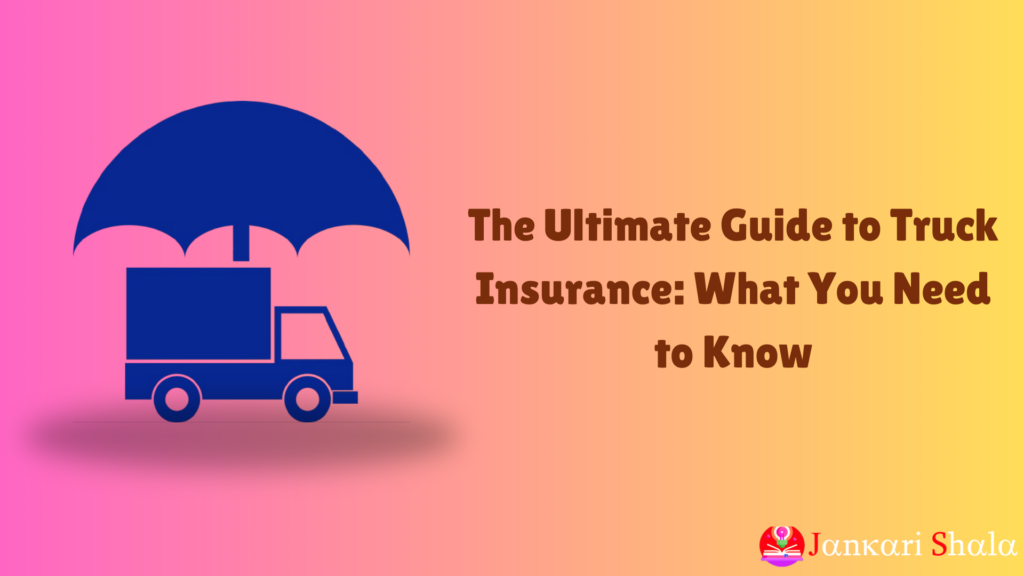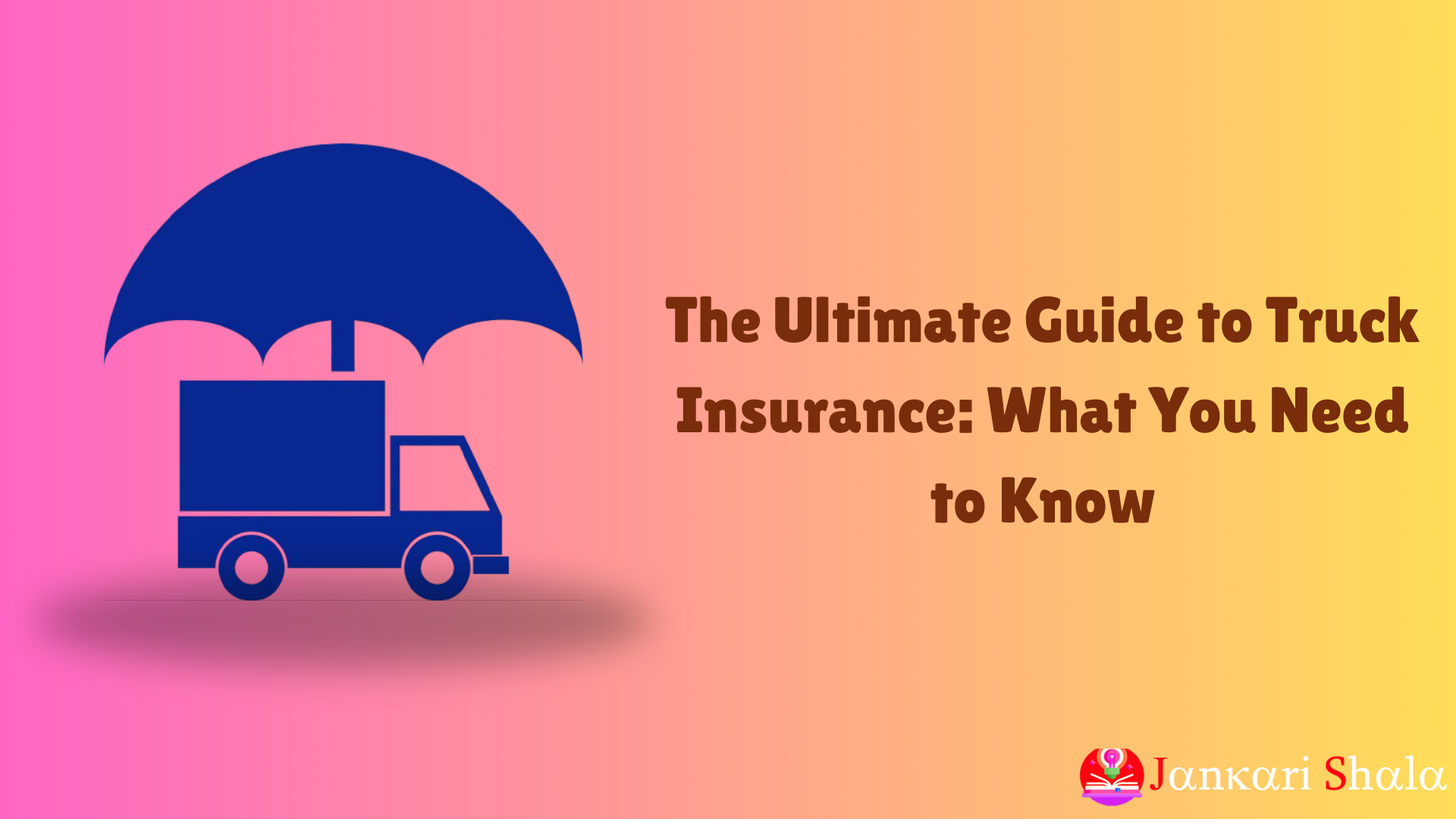In today’s fast-paced economy, the trucking industry is crucial for transporting goods across vast distances. Whether you operate a single truck or manage a fleet, having comprehensive insurance coverage is essential to protect your assets and mitigate risks. Truck insurance, also known as commercial truck insurance or motor carrier insurance, is specifically designed to address the unique needs and challenges of commercial trucking operations.

Understanding Truck Insurance
Truck insurance differs significantly from personal auto insurance. While personal auto insurance covers vehicles primarily for personal use, truck insurance is tailored to cover vehicles used for business purposes. Commercial trucks face distinct risks due to their size, weight, and the nature of their cargo. Truck insurance policies are crafted to provide comprehensive coverage against these risks, ensuring that businesses can continue operations even after unexpected incidents.
Types of Truck Insurance Coverage
1. Primary Liability Insurance
Primary liability insurance is a fundamental requirement for all commercial trucks operating on public roads in the United States. It covers damages and injuries to others in accidents where you or your drivers are at fault. This insurance is essential for protecting against the financial consequences of bodily injury and property damage claims resulting from accidents.
2. Physical Damage Coverage
Physical damage coverage protects your truck itself from damage. It includes collision coverage, which covers damage resulting from collisions with other vehicles or objects, and comprehensive coverage, which covers non-collision incidents such as theft, vandalism, fire, or natural disasters. This coverage is crucial for ensuring that your vehicles can be repaired or replaced promptly after an incident, minimizing downtime and financial losses.
3. Cargo Insurance
Cargo insurance covers the goods or freight your truck is transporting. It protects against damage, theft, or loss of cargo during transit. This coverage is essential for businesses that transport valuable or sensitive cargo, providing peace of mind that financial losses due to cargo damage or loss will be covered.
4. Non-Trucking Liability Insurance (Bobtail Insurance)
Non-trucking liability insurance, often referred to as bobtail insurance, provides coverage when your truck is operated without a trailer or outside of work hours. This insurance is important for protecting against liability claims that may arise during personal use of the truck, ensuring that you are covered even when the truck is not actively engaged in business operations.
5. General Liability Insurance
General liability insurance covers claims of bodily injury or property damage that occur at your business premises or as a result of your business operations. This coverage protects against lawsuits and legal expenses arising from accidents or injuries that occur in connection with your trucking business.
6. Uninsured/Underinsured Motorist Coverage
Uninsured/underinsured motorist coverage protects you and your truck in case of an accident where the at-fault driver does not have insurance or enough insurance to cover your damages. This coverage ensures that you are financially protected against losses caused by uninsured or underinsured drivers, offering peace of mind that your assets and livelihood are secure.
Factors Influencing Truck Insurance Costs
Several factors influence the cost of truck insurance premiums. Understanding these factors can help businesses manage costs effectively and find the best coverage for their needs. Factors include the type of truck and cargo, coverage limits, deductibles, location, safety measures, and claims history.
Choosing the Right Truck Insurance
Choosing the best truck insurance policy involves assessing your specific needs, comparing coverage options, and selecting a reputable insurance provider. By following a systematic approach, businesses can make informed decisions that align with their operational requirements and budgetary constraints.
- Assess Your Coverage Needs: Evaluate the risks your trucks face based on the type of operation, cargo, and routes. Consider consulting with an insurance professional to conduct a thorough assessment of your insurance needs and identify potential gaps in coverage.
- Understand Legal Requirements: Familiarize yourself with the mandatory insurance requirements for commercial trucks in your jurisdiction. Ensure that your insurance policy meets or exceeds these requirements to avoid penalties or legal issues.
- Compare Insurance Quotes: Obtain quotes from multiple insurers to compare coverage options, premiums, deductibles, and policy terms. Look beyond the price to understand what each policy covers and excludes, ensuring that you choose comprehensive coverage that adequately protects your business.
- Research Insurance Companies: Research the financial stability, reputation, and claims handling process of insurance companies. Choose an insurer with a proven track record of reliability and customer satisfaction to ensure that you receive prompt and fair claims assistance when needed.
- Review Policy Details: Carefully review the terms, conditions, and exclusions of each insurance policy before making a decision. Pay attention to coverage limits, deductibles, and any additional endorsements or riders that may be necessary to meet your specific needs and mitigate risks effectively.
- Consider Additional Coverages: Depending on your business needs, consider additional coverages such as general liability insurance or cargo insurance. These coverages can provide added protection against unforeseen events and liabilities, enhancing the overall risk management strategy of your trucking business.
- Evaluate Customer Service: Choose an insurance provider known for excellent customer service and support. Ensure that they are accessible and responsive to your needs, especially when it comes to claims processing and policy inquiries.
- Consult with an Insurance Professional: If needed, seek guidance from an insurance agent or broker specializing in commercial truck insurance. An experienced professional can provide valuable insights and recommendations based on industry knowledge and expertise.
Must Read:
Frequently Asked Questions (FAQs)
1. Is truck insurance mandatory?
Yes, primary liability insurance is mandatory for all commercial trucks operating on public roads in the United States. It is a legal requirement designed to protect against financial losses resulting from accidents and liability claims.
2. What does cargo insurance cover?
Cargo insurance covers the goods or freight your truck is transporting against damage, theft, or loss during transit. It provides financial compensation for losses incurred due to covered perils, ensuring that businesses are reimbursed for damaged or lost cargo.
3. How can I save money on truck insurance?
There are several ways to save money on truck insurance premiums, including maintaining a clean driving record, opting for higher deductibles, implementing safety measures, comparing quotes from different insurers, and bundling policies with the same insurer.
4. How do I file a claim with my truck insurance company?
To file a claim, contact your insurance company’s claims department promptly after an incident. Provide detailed information and documentation, such as accident reports, photographs, and witness statements, to support your claim. Work closely with your insurer to ensure that the claims process is smooth and efficient, minimizing disruptions to your business operations.
Conclusion
Truck insurance is a critical investment for businesses involved in commercial trucking. It protects against financial losses stemming from accidents, theft, liability claims, and other unforeseen events, safeguarding the assets and operations of trucking companies. By understanding the types of coverage available, assessing specific insurance needs, comparing quotes, and selecting a reputable insurance provider, businesses can make informed decisions that promote long-term success and resilience in a competitive industry.
Regularly review your insurance policy and coverage needs to adapt to changes in your business operations, regulatory requirements, and industry trends. With the right insurance partner and proactive risk management strategies, you can navigate the complexities of truck insurance confidently and focus on growing your business while mitigating potential risks effectively
